Analysis of the past month (including charts and data)
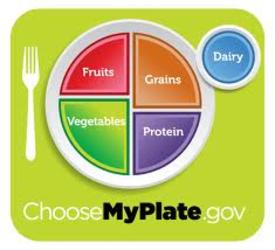
dengarrett
Posts: 367 Member
Here is a comparison of what I planned to burn, what my recordings said I burned, and what I actually burned based on the weight I lost. I GLADLY welcome and appreciate any observations, recommendations, etc.
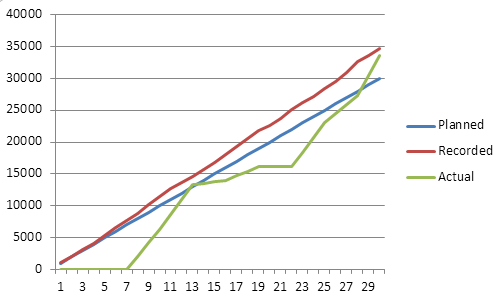
My first goal is to get the “Recorded” and “Actual” lines to match as closely as possible. While it is encouraging to see that they are very close at the end of the period, I have no reason to believe that I can maintain that given the inconsistency of how they track with each other. I made the following changes during this period of time, mostly during the last half:
a .Began paying attention to water and nutrient targets.
b. Increased my water intake.
c. Worked to keep sodium on target.
d. Worked to decrease sugar intake, with most of the effort centered around reducing sugar in my breakfast bars (that my wife lovingly makes for me) and reducing the amount of lo-cal dressing I use on my lunch salads, and using sugar-free coffee creamer.
e. Began taking multi-vitamin and calcium supplement.
f. Began eating more veggie snacks.
g. Increased intensity of my workouts over the period from Wii guided workouts and walking to fairly intense step aerobics and at the end, doing 60 minute sessions on my recumbent bike.
So my biggest question is what will happen with the relationship of my actual vs. recorded lines. If the actual line keeps climbing then I will start to worry about how healthy my approach is for me. However, if the actual line levels off, but tracks at a predictable distance from recorded then I know that I need to adjust how or what I record so that it reflects reality.
Secondary to me (at this point in my journey) is how both actual and recorded tracks with planned. I think this speaks to arguments such as “should I eat back my exercise calories”. I have so much to lose right now that I just don’t think such concerns are pertinent. Once I know that I can accurately track what my body does, then I know I can trust any adjustments I make in order to control it in order to make adjustments based on planning.
All of this data comes straight from what I recorded in MFP, but next period I am going to track my weight myself, because MFP does not give me granular enough data. Also, I weigh myself daily, but do not record on any consistent basis (I know this is a no no). Maybe I didn’t get the granular data because of this. Next period, I will be more careful and record my data myself if needed to get the data I need. For the purpose of the charts, I interpolated the gaps by adding the average between the known data points.
Here is the raw data:
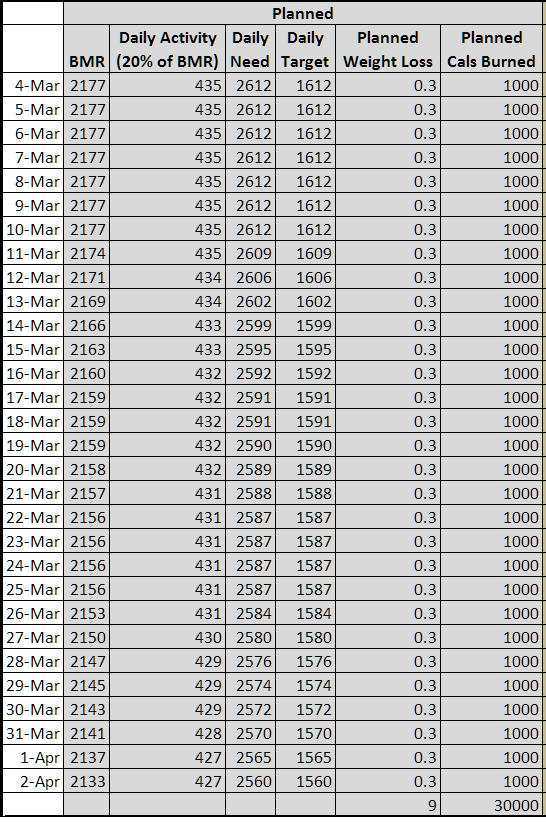
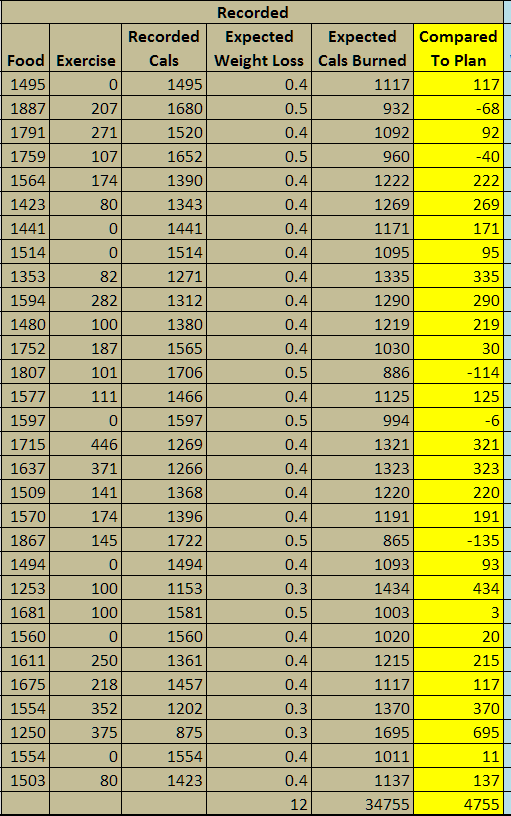
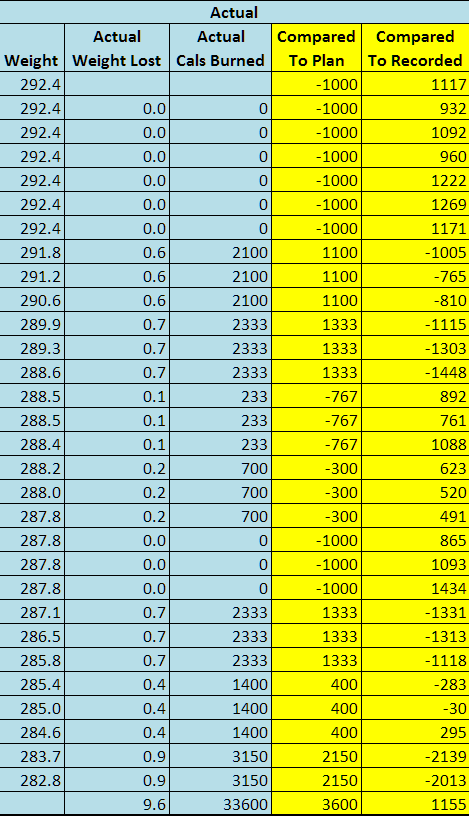

My first goal is to get the “Recorded” and “Actual” lines to match as closely as possible. While it is encouraging to see that they are very close at the end of the period, I have no reason to believe that I can maintain that given the inconsistency of how they track with each other. I made the following changes during this period of time, mostly during the last half:
a .Began paying attention to water and nutrient targets.
b. Increased my water intake.
c. Worked to keep sodium on target.
d. Worked to decrease sugar intake, with most of the effort centered around reducing sugar in my breakfast bars (that my wife lovingly makes for me) and reducing the amount of lo-cal dressing I use on my lunch salads, and using sugar-free coffee creamer.
e. Began taking multi-vitamin and calcium supplement.
f. Began eating more veggie snacks.
g. Increased intensity of my workouts over the period from Wii guided workouts and walking to fairly intense step aerobics and at the end, doing 60 minute sessions on my recumbent bike.
So my biggest question is what will happen with the relationship of my actual vs. recorded lines. If the actual line keeps climbing then I will start to worry about how healthy my approach is for me. However, if the actual line levels off, but tracks at a predictable distance from recorded then I know that I need to adjust how or what I record so that it reflects reality.
Secondary to me (at this point in my journey) is how both actual and recorded tracks with planned. I think this speaks to arguments such as “should I eat back my exercise calories”. I have so much to lose right now that I just don’t think such concerns are pertinent. Once I know that I can accurately track what my body does, then I know I can trust any adjustments I make in order to control it in order to make adjustments based on planning.
All of this data comes straight from what I recorded in MFP, but next period I am going to track my weight myself, because MFP does not give me granular enough data. Also, I weigh myself daily, but do not record on any consistent basis (I know this is a no no). Maybe I didn’t get the granular data because of this. Next period, I will be more careful and record my data myself if needed to get the data I need. For the purpose of the charts, I interpolated the gaps by adding the average between the known data points.
Here is the raw data:



0
Replies
-
I have a oouple comments to make. Firsthand foremost, I LOVE your analytical breakdown of your progress. Youre treating this as a project and it shows youre making an investmentvin yourself Congratulations!
Second, like a good project manager you observed weaknesses in your plan and made adjustments midcourse to your plan to eliminate where you were coming up short. Congrats on that too.
I'm not sure what the difference is in actual vs. Recorded. And you explain that?
I weigh myself daily. This could open up a whole new debate, but it is what works for me and I have a track record of success. However, I don't record my weight daily either. There's too many variables day to day, instead I record once a week. I don't see anything wrong with your approach there. Keep it up. Great job.0 -
Well - yeah I do a lot of project planningI have a oouple comments to make. Firsthand foremost, I LOVE your analytical breakdown of your progress. Youre treating this as a project and it shows youre making an investmentvin yourself Congratulations!
Second, like a good project manager you observed weaknesses in your plan and made adjustments midcourse to your plan to eliminate where you were coming up short. Congrats on that too.
I'm not sure what the difference is in actual vs. Recorded. And you explain that?
I weigh myself daily. This could open up a whole new debate, but it is what works for me and I have a track record of success. However, I don't record my weight daily either. There's too many variables day to day, instead I record once a week. I don't see anything wrong with your approach there. Keep it up. Great job. Didn't realize it would show through in this LOL
Didn't realize it would show through in this LOL
Recorded is based on the data recorded in MFP - calories consumed, exercise, and recorded weight.
Actual is based on taking my weight recorded and multiplying by 3500 to get back to calories. I do see the problem in this given the variables as you mention. Who knows how much of that is fat. But it's the best I can currently get and I think is still valuable. I have ordered a new scale that is supposed to give me more parameters (fat percentage, water, etc). I will work incorporate those in. Again - who knows how accurate but as long as it is consistent then I can plan and adjust around it.
Thank you!0 -
My only thoughts is that the variable is actually not in what you burned, but on intake - the calorie guidelines for food are NO WAY accurate for every piece of item - an apple says 80 calories for a medium - but if you actually measured every apple, the calories probably fluctuate several calories -
Same goes for pre-measured foods like purchased snack bars - there is no way that every single bar produced has exactly the same gram weights for each and every nutrient and vitamin listed - its just impossible -
so that is my thought.. and btw I only read about half of your post - too technical for me - I am an artsy person, not a statistical person!0 -
Thanks - the data is just based on what I entered in MFP.My only thoughts is that the variable is actually not in what you burned, but on intake - the calorie guidelines for food are NO WAY accurate for every piece of item - an apple says 80 calories for a medium - but if you actually measured every apple, the calories probably fluctuate several calories -
Same goes for pre-measured foods like purchased snack bars - there is no way that every single bar produced has exactly the same gram weights for each and every nutrient and vitamin listed - its just impossible -
so that is my thought.. and btw I only read about half of your post - too technical for me - I am an artsy person, not a statistical person!0 -
oh - if it did not come across this way, I wanted to say awesome job! I think it is fabulous that you tracked all of this - definitely shows a dedication to the weight loss process! I only meant my comments to help as to why your actual weight loss varied from the planned weight loss due to the recording of the calories taken in and burned.
Great work all the way around! And also take anything I said with a grain of salt since I did not read everything you wrote 0
0 -
I love the charts! I need to do something like that..... thanks for sharing!0
-
Oh no I took it all as flattering and helpful! This all does boil down to some very inexact science. All of this is an effort to control a very complex system which is metabolism. By tracking planned (I want to lose 2 pounds per week which is 1000 calories per day) against what I record in MFP, and my actual weight loss I can begin to work towards "tuning" the system. Geez I do sound like a pm don't I? Loloh - if it did not come across this way, I wanted to say awesome job! I think it is fabulous that you tracked all of this - definitely shows a dedication to the weight loss process! I only meant my comments to help as to why your actual weight loss varied from the planned weight loss due to the recording of the calories taken in and burned.
Great work all the way around! And also take anything I said with a grain of salt since I did not read everything you wrote 0
0 -
Thanks - I can send you my spreadsheet if you want - just send me your email address.I love the charts! I need to do something like that..... thanks for sharing!0 -
bump i would like something like this0
-
Math challenged here, so let me see if I have this right. To get the Actual, you multiply your # lbs lost by 3500 to get the number of calories that you would actually have needed to burn in order to lose the amount your scales say you lost, correct?
This is so cool!! Thanks for sharing. Can you show us how to set up the spreadsheet? I really want to try this!0 -
About using actual daily weight vs interpolating between known data points:
I too weigh myself daily, and--at least for women--I think using actual daily weight would create unnecessary weirdnesses in the results. I gain 2lbs the first day after a weight-lifting workout (which I lose again by the 2nd day). I am sometimes 1-2 pounds up for TOM, but sometimes 1-2 pounds down. Either way, that resolves itself sometime between the 7th and 9th day after day 1 of TOM, which gives the appearance of a sudden weight loss or gain.
I don't know the technical term for a situation in which collecting more data actually confuses the issue, but I think this is such a situation.0 -
Yes that is the math I used to get the actual calories burned. I agree that there are many factors that make it less than perfect (and I have learned from reading posts that women have more variability with TOM - see I even learned the acronym). But the main point is that we are planning and recording based on the belief that we ARE producing the actual results. And we ARE otherwise why do it? I think the real value in tracking like this is to ACCOUNT for the variables we cannot control. To be able to look at the deviations and say "oh that's when I overloaded on sodium" or "that was my TOM".
Saying it a different way - once we are able to predict and measure the effect our actions have on our weight then we can take responsibility for them and stop blaming ourselves for the things we have no control over.
Also - the effects of most items that are beyond our control last a short period of time. Over a longer period of planning, recording and measuring these should even out and we can see that we are able to control our weight.
These are all just my thoughts and observations so I welcome the comments and discussion.
When I get home this evening I will share the details on the spreadsheet.0 -
Sorry--I wasn't very clear. When I said that collecting more data might confuse the issue, I was referring ONLY to your comment about whether you would have better data if you entered actual weight every single day instead of weighing 2-3 times a week and splitting the difference for the intervening days. I wasn't dissing the overall project (which I think is way cool). But I also do agree with you about the possible benefits of including actual daily weight in terms of very clearly identifying the patterns of fluctuation.
This seems like a kind of research that really needs to be done by a lot of people over a long period of time. There's a lot that really is not known (empirically, in a hard-core research sense) about weight, and a long-term population study based on this kind of data would be a great place to start. (I'm thinking of the Nurses' Health Study http://www.channing.harvard.edu/nhs/ when I say long-term population studies.) Maybe you could organize a similar study using MFP?
Meanwhile, though, I'm really eager to get started doing this for myself and seeing other people's results! Looking forward to the spreadsheet.0 -
I'm sorry - I get into an analytical mode and forget to watch the edges in what I type
 . I didn't take anything you said as being negative in any way and I didnt mean to be negative. I appreciate and enjoy the discussion.
. I didn't take anything you said as being negative in any way and I didnt mean to be negative. I appreciate and enjoy the discussion.
I can send you my spreadsheet this evening if you want to send me your email address. I don't think you can attach files in MFP messages?
I think it could be very interesting to see this kind of info charted for multiple people. Maybe you and I can start it and see if we can get others to join?
I also think we should see the graphs both with and without the explained deviations because it may be helpful to visualize it both ways. I might possibly represent a "what if" sort of thing. Hey maybe that's it - once you can correlate actions to the data you can then ask what if questions by adding or removing those points and interpolating the data in between.
Hummm0 -
My first goal is to get the “Recorded” and “Actual” lines to match as closely as possible. [...] I have no reason to believe that I can maintain that given the inconsistency of how they track with each other.
You are going to get that sort of fluctuation. Try plotting a 7 day moving average, then see what you get.
Also, consider using a body composition analyser - that'll help you filter out the water and muscle components of your loss (bear in mind that a pound of muscle lost is 1750 calories)0 -
Excellent point about the weight of muscle. I have a new scale on the way that will yell water and muscle.
Thanks for the tip on the moving average - curious as to why you picked 7 days?0 -
Thanks for the tip on the moving average - curious as to why you picked 7 days?
Good question. Unfortunately the answer is "it feels about right"
It's sufficiently responsive that you don't miss trends when they start, but sufficiently smoothed to hide fluctuations?
It also ties in with the advice to weigh once a week (which is a very crude 7 day average.....)
As playing with numbers is your comfort zone I'll recommend the hackers diet to you - http://www.fourmilab.ch/hackdiet/0 -
I will be happy to share the spreadsheet if you can send me your email address.0
-
I sent my e-mail address using MFPs personal message system.0
-
Hemlock, I'm sorry but I don't see a message from you. I will try sending you my email address.I sent my e-mail address using MFPs personal message system.0 -
Hey, that works for meThanks for the tip on the moving average - curious as to why you picked 7 days?
Good question. Unfortunately the answer is "it feels about right"
It's sufficiently responsive that you don't miss trends when they start, but sufficiently smoothed to hide fluctuations?
It also ties in with the advice to weigh once a week (which is a very crude 7 day average.....)
As playing with numbers is your comfort zone I'll recommend the hackers diet to you - http://www.fourmilab.ch/hackdiet/
I wil check out the web site - thanks. It looks very interesting!0 -
I am a data/excel freak so I appreciate the how you have been breaking down all the data into usable forecasts. Also gotta love the charts! I may need to add some to my spreadsheets.
 0
0 -
bump0
-
So I changed the chart to use a seven day moving average as was suggested by PoleBoy. This shows that my results are MUCH closer than I thought AND the period of greatest deviation can be explained - it is when I was on vacation! I didn't eat that badly, but my exercise level was way down. This is exacly what I wanted to achieve - have the recorded track with the actual and be able to explain the deviations. After I see this pattern continue, I will then begin working on getting the actual and recorded match the planned - probably by changing the planned

 0
0 -
I see that you take a calcium supp. may i suggest that most people who take calcium also take a vit. d supp. Most calcium supp.s have vit d in them but some dont at the same time. the vit. d helps the calcium absorb into your system better:)0
-
Thanks - actually I take Caltrate which is a Calcium & Vitamin D combination (recommended by my Dr.) But I didn't know it was to improve the absorption. Great to know!I see that you take a calcium supp. may i suggest that most people who take calcium also take a vit. d supp. Most calcium supp.s have vit d in them but some dont at the same time. the vit. d helps the calcium absorb into your system better:)0 -
I thought I was a nerd keeping graph paper charts of daily weight with data about exercise, calories and sodium (as well as a few other pieces of TMI), but here I find out I'm barely a nerd at all! Sorry, I think it's cool.
I was going to suggest using a little less data, which would equate to the every 7 days approach. There are just too many daily variables. Over the last two weeks my weight has gone up as much as 4 pounds in 5 days, and down by as much as 2 pounds overnight. I just pass off all the increases as water weight, and the losses as real. My second chart only has 4 points per month, so the trend is almost 100% downward.
If you get motivated with all this, then by all means keep it up. If it gets to be a burden, drop it. I'm not trying to be negative. I think we need people willing to take on this kind of data collection. I'm impressed with your work, but I hope you don't make it about the data, and make it about a better life. Best of luck.0 -
Yes that is the math I used to get the actual calories burned. I agree that there are many factors that make it less than perfect (and I have learned from reading posts that women have more variability with TOM - see I even learned the acronym). But the main point is that we are planning and recording based on the belief that we ARE producing the actual results. And we ARE otherwise why do it? I think the real value in tracking like this is to ACCOUNT for the variables we cannot control. To be able to look at the deviations and say "oh that's when I overloaded on sodium" or "that was my TOM".
Saying it a different way - once we are able to predict and measure the effect our actions have on our weight then we can take responsibility for them and stop blaming ourselves for the things we have no control over.
Also - the effects of most items that are beyond our control last a short period of time. Over a longer period of planning, recording and measuring these should even out and we can see that we are able to control our weight.
These are all just my thoughts and observations so I welcome the comments and discussion.
When I get home this evening I will share the details on the spreadsheet.
I agree with your evaluation here. You're looking for the triggers that cause you to deviate from the plan so that you can better prepare for or anticipate them and not be confuzzled when you've suddenly gained 3 lbs and have been exercising so hard.
A lot of us are really unaware of what we're actually doing until we start logging, then the light bulb goes off. That leaves us with a general feeling of "now what" and a lack of direction. Cutting calories is one part of the overall equation but sometimes it's not enough (as in the case of a plateau where you actually need to increase and/or stagger calories to get the momentum back). This is an interesting aspect of what's really going on here. Maybe you should consider working with the site owner to incorporate it for everyone as part of the site. Seems like it could shed some really focused light on what we're doing.
Congratulations on your loss, your focus and your motivation!
Keep up the great work!
ETA after reading your research posts about population trials: If this was part of the site, you could gather that information seamlessly and for countless thousands if not millions of people. I would seriously consider at least discussing it with him (them).0 -
Thanks - yeah I know I'm a nerdI thought I was a nerd keeping graph paper charts of daily weight with data about exercise, calories and sodium (as well as a few other pieces of TMI), but here I find out I'm barely a nerd at all! Sorry, I think it's cool.
I was going to suggest using a little less data, which would equate to the every 7 days approach. There are just too many daily variables. Over the last two weeks my weight has gone up as much as 4 pounds in 5 days, and down by as much as 2 pounds overnight. I just pass off all the increases as water weight, and the losses as real. My second chart only has 4 points per month, so the trend is almost 100% downward.
If you get motivated with all this, then by all means keep it up. If it gets to be a burden, drop it. I'm not trying to be negative. I think we need people willing to take on this kind of data collection. I'm impressed with your work, but I hope you don't make it about the data, and make it about a better life. Best of luck. It is actually not a burden at all - all I have to do is add the additional row to the spreadsheet each day.
It is actually not a burden at all - all I have to do is add the additional row to the spreadsheet each day.
The seven day moving average idea did wonders for smoothing out the data (take a look at the graph at the end of the first page of this topic). And, it enabled me to see really where the deviation was (my vacation).0 -
Wow, at first I thought - way too much data. And then I remembered the spreadsheet I'VE been keeping for the last 15 months. Just weekly weight change in a chart and two graphs ;-) I wish now I had entered the calories as well. I just might go back and collect the data off of MFP although I think I'd have to do it manually.
Something my graph of 65 data points does show though is that weight loss does tend to fluctuate - there are even little bumps upward of 1 - 2 pounds plus some big drops of four pounds. I can only roughly align them with calorie consumption - holidays, vacations and so on - and the odd thing is that it doesn't always correlate. Sometimes I lose during vacation and gain 2 pounds on a stick-to-plan week. I wonder if maybe the body takes its own time to adjust - calorie loss this week, weight loss the next. Also, there seems to be a bounce factor - a big weight loss week will be followed by a small bounce up the next week. But the overall picture is a loss line with a fairly steady slope - its starting to flatten slightly now that I am at a much lower body weight.
So don't be concerned if recorded and actual don't always align even with a seven day rolling average. The more data you collect - meaning the more weight you lose! - the more you'll see that it's the long haul that is the most significant.0
This discussion has been closed.
Categories
- All Categories
- 1.4M Health, Wellness and Goals
- 398.2K Introduce Yourself
- 44.7K Getting Started
- 261K Health and Weight Loss
- 176.4K Food and Nutrition
- 47.7K Recipes
- 233K Fitness and Exercise
- 462 Sleep, Mindfulness and Overall Wellness
- 6.5K Goal: Maintaining Weight
- 8.7K Goal: Gaining Weight and Body Building
- 153.5K Motivation and Support
- 8.4K Challenges
- 1.4K Debate Club
- 96.5K Chit-Chat
- 2.6K Fun and Games
- 4.8K MyFitnessPal Information
- 12 News and Announcements
- 21 MyFitnessPal Academy
- 1.6K Feature Suggestions and Ideas
- 3.2K MyFitnessPal Tech Support Questions
Do you Love MyFitnessPal? Have you crushed a goal or improved your life through better nutrition using MyFitnessPal?
Share your success and inspire others. Leave us a review on Apple Or Google Play stores!
Share your success and inspire others. Leave us a review on Apple Or Google Play stores!











